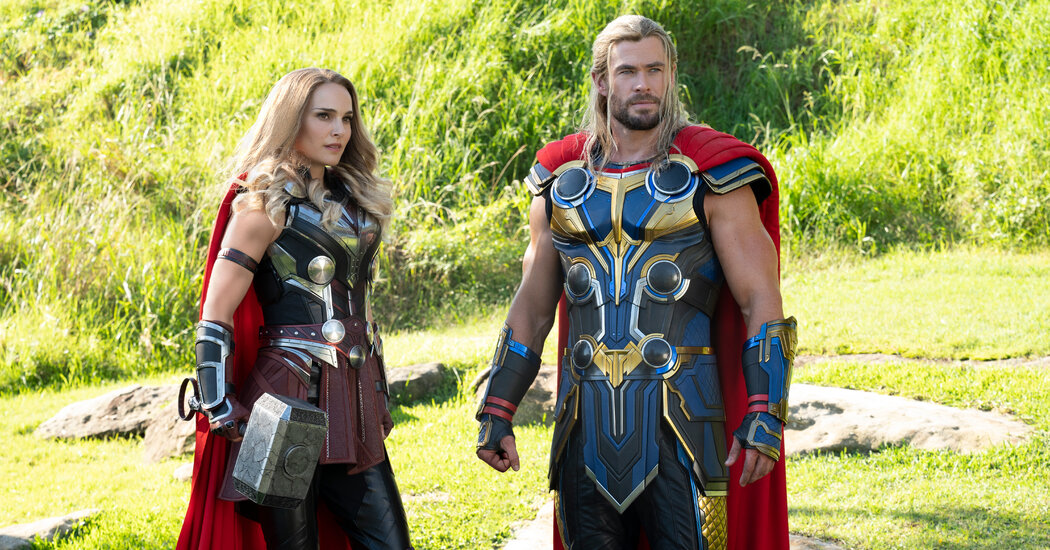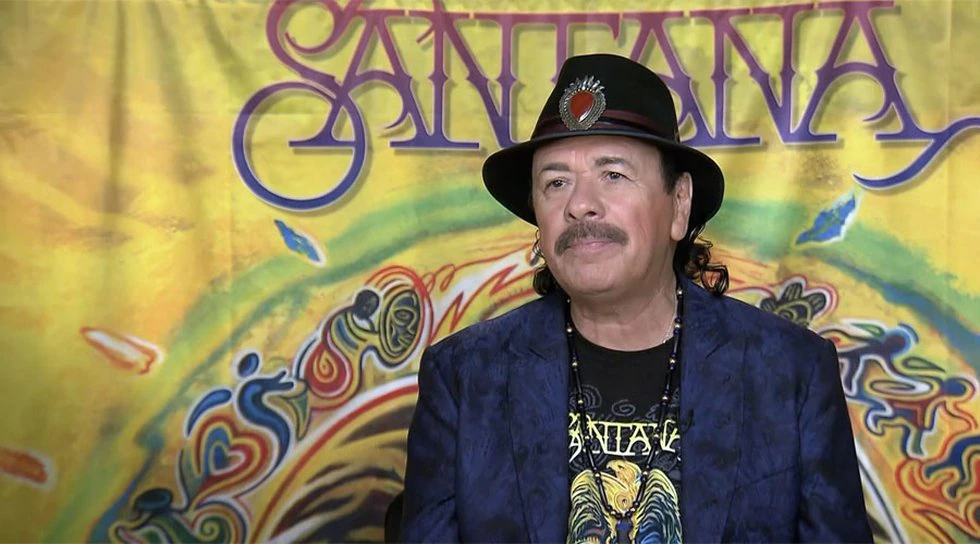Every so often in “Thor: Love and Thunder,” the 92nd Marvel movie to hit theaters this year (OK, the third), the studio machinery hits pause, and the picture opens a portal to another dimension: Its star, Chris Hemsworth, embraces wholesale self-parody, a pair of giant screaming goats gallop along a rainbow highway and Russell Crowe flounces around in a flirty skirt and Shirley Temple curls. As the movie briefly slips into a parallel realm of play and pleasure, you can feel the director Taika Waititi having a good time — and it’s infectious.
This is the fourth “Thor” movie in 11 years and the second that Waititi has directed, following “Thor: Ragnarok” (2017). That movie was all over the place, but it was funny (enough) and had a lightness that proved liberating for the series and Hemsworth. “Love and Thunder” is sillier than any of its predecessors, and thinner. A lot happens in overstuffed Marvel Studios fashion. But because the series has jettisoned many of its earlier components — its Shakespearean pretensions, meddlesome relatives and, crucially, Thor’s godly grandeur — the new movie more or less plays like a rescue mission with jokes, tears and smackdowns.
It starts with a pasty, near-unrecognizable Christian Bale, who, having been relieved of his DC Dark Knight duties, has signed up with Marvel as a villain with the spoiler name of Gorr the God Butcher. Waititi quickly sketches in Gorr’s background, giving it a tragic cast. Believing himself betrayed by the god he once worshiped, Gorr is committed to destroying other deities. It’s potentially rich storytelling terrain, particularly given Thor’s stature and Marvel’s role as a contemporary mythmaker. But while Bale takes the role by the throat, as is his habit, investing the character with frictional intensity, Gorr proves disappointingly dull.
For the most part, Gorr simply gives Thor another chance to play the hero, which Hemsworth does with a stellar deadpan and appreciable suppleness. He’s always been fun to watch in the role and not just because, as the slavering camerawork likes to remind you, he looks awfully fine with or without clothes. Hemsworth knows how to move, which is surprising given his muscled bulk, and is at ease with his beauty. He’s also learned how to deploy — and puncture — Thor’s inborn pomposity, although by the time the final credits rolled in “Ragnarok” that haughtiness had turned into shtick. Thor is still a god, but also he’s now a great big goof.
To that end, Thor enters midfight on a battlefield washed in grayish red light, preening and posing and showboating alongside characters from Marvel’s “Guardians of the Galaxy.” With Guardians (Chris Pratt, the raccoon voiced by Bradley Cooper, etc.) on backup, Thor vanquishes the enemy with his customary hyperbole — he strikes the ground, reaches for the heavens, flips his hair — and a new hammer the size of a backhoe shovel. He also destroys a temple that looks right out of an airport gift shop. This synergistic foreplay isn’t pretty, and neither is the rest of the movie, but it announces Waititi’s sensibilities, his irreverence and taste for kitsch.
From the start, the “Thor” series has pushed and pulled at its title character, by turns enshrining and undercutting his supernatural identity, raising him up only to bring him crashing back down to Earth. The movies have, almost to a fault, emphasized Thor’s frailties: He has daddy issues, a sibling rivalry and romantic woes. Gods, they’re just like us! Thor’s love life humanized him for good and bad, though his romance with an astrophysicist — Natalie Portman’s Jane Foster — worked best as ballast for the he-man action. Jane wasn’t interesting, despite Portman’s febrile smiles, but, after sitting out the last movie, she’s back.
Why the encore? Well, mostly because Waititi, who wrote the script with Jennifer Kaytin Robinson, doesn’t seem to know what else he can do with Thor. By the end of “Ragnarok,” the character had been repeatedly cut down to size. He’d squabbled with his brother and wittiest foil (Tom Hiddleston as Loki). His long hair was chopped off and his kingdom annihilated, and gone too were the heavyweights who had helped fill the story’s holes with their magnetism and personality. Anthony Hopkins (Thor’s dad) exited, as did Cate Blanchett (sis). Thor fought, loved and lost, and then he packed on the pounds and went to hang with the Avengers.
“Love and Thunder” revs up the “Thor” franchise again with the usual quips and beats, programmatically timed blowouts, brand-extending details, a kidnapping and a welcome if underused Tessa Thompson. Her Valkyrie, alas, receives less screen time than Jane, who’s given a crisis as well as special powers, a blond blowout and muscles that inflate and deflate like party balloons. Jane’s new talents don’t do much for the story and read as a dutiful nod to women’s empowerment (thanks). Portman does what she can, yet she’s so tightly wound that she never syncs up with the loosey-goosey rhythms the way Thompson and Hemsworth do.
Waititi’s playfulness buoys “Love and Thunder,” but the insistence on Thor’s likability, his decency and dude-ness, has become a creative dead end. The movie has its attractions, notably Hemsworth, Thompson and Crowe, whose Zeus vamps through a sequence with a butt-naked Thor and fainting minions. It’s a delightful and cheerfully vulgar interlude, and critically, it reminds you of the sheer otherworldliness of these beings who — with their vanities, cruelties, deeds, mysteries and powers — turn reality into myth and stories into dreams. Like movie stars, gods aren’t like us, which of course is one reason we invented them.
Thor: Love and Thunder
Rated PG-13 for superhero violence. Running time: 2 hours 5 minutes. In theaters.



